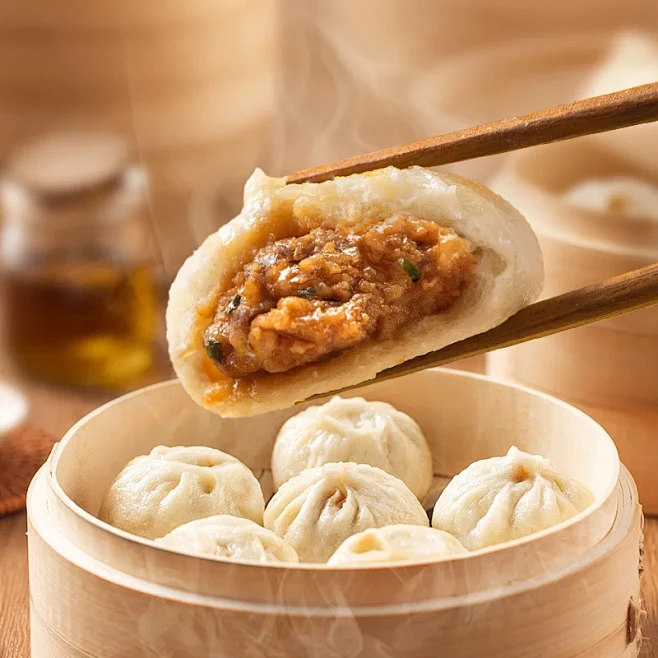Chinese cuisine
Steamed Buns (Baozi)
Baozi: A Staple of Chinese Culinary Culture
Baozi, pronounced “bāo zi” in Mandarin, hold a cherished place in Chinese culinary culture. People make these soft, fluffy steamed buns from carefully kneaded dough, which they then let rise and shape into small, round pouches. Next, they generously fill these pouches with a diverse range of savory or sweet ingredients, making baozi incredibly versatile and appealing to various tastes.
For savory fillings, the classic pork baozi stands out. Chefs mince pork and mix it with a flavorful blend of seasonings like soy sauce, ginger, scallions, and sometimes a touch of sesame oil. The result is tender, juicy, and perfectly seasoned pork that offers a rich, satisfying taste. Vegetable baozi, on the other hand, provide a lighter option. They contain a medley of fresh vegetables such as cabbage, carrots, mushrooms, and bean sprouts, all seasoned to enhance their natural flavors. Among the sweet variants, red bean paste baozi enjoy great popularity. Cooks slow – cook the red bean paste to a smooth, sweet consistency, creating a delicious contrast with the soft, steamed dough.
In China, baozi are more than just food; they’re a way of life. They serve as a staple breakfast item, with many starting their day by grabbing a hot baozi from a street vendor or local breakfast shop. Their portability and convenience make them an ideal choice for those on the go. People also commonly enjoy them as a snack throughout the day, and you can find them on the menus of dim sum restaurants, where they’re often served alongside other bite – sized delicacies.
Baozi have achieved an 80% acceptance rate among foreigners. Several factors contribute to their rising popularity abroad. The soft, pillowy texture of the bun appeals to those who like bread – like items, and the variety of fillings means there’s something for everyone. In many Western countries, as interest in Chinese cuisine has grown, baozi have become a sought – after item in Chinese restaurants and even some mainstream food markets.
Regarding pricing, the cost of baozi varies by location. Overseas, in Chinese restaurants or specialty food stores, each bun typically costs between $1 and $3. This price reflects the labor – intensive process of making baozi, from preparing the dough and fillings to the steaming process. In Chinese local markets, baozi are much more affordable, priced between 1 – 5 RMB (around $0.15 – $0.7). This affordability makes them accessible to a wide range of consumers, from students to working professionals, explaining their continued popularity in China.
Related Keywords: Chinese Breakfast, Pork Buns, Sweet Buns. These keywords effectively capture the essence of baozi. “Chinese Breakfast” emphasizes their significance in the morning meal in Chinese culture, “Pork Buns” highlights one of the most classic and beloved savory fillings, and “Sweet Buns” draws attention to the delightful sweet versions, helping food enthusiasts easily find and explore more about these wonderful Chinese steamed delicacies.


